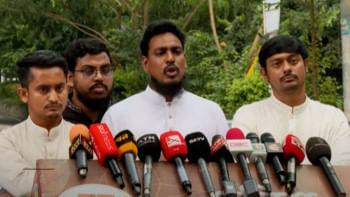Textile has room for Tk 50,000cr investment
Bangladesh has the scope to invest a fresh Tk 50,000 crore in the primary textile sector (PTS) over the next five years as the demand for locally made fabrics has been rising in both the domestic and international markets.
The government should supply energy and industrial land at a reasonable price so that the spinners and weavers feel encouraged to invest in the sector, said Mohammad Ali Khokon, president of Bangladesh Textile Mills Association (BTMA).
Currently, the local spinners can supply 85 percent of the raw materials to the export-oriented knitwear sector and 35 to 40 percent to the woven sector.
“So, Bangladesh has the opening for fresh investment in woven fabrics production,” Khokon said at a press conference at the BTMA office in Dhaka yesterday to announce the 16th Dhaka International Textile and Garment Machinery Exhibition (DTG) 2019.
The newly-elected BTMA president is hopeful that local weavers can supply 60 percent of the requirement for woven fabrics in the next five years, which will also reduce the dependence on imports, especially from China and India.
Bangladeshi garment makers use 12 billion metres of fabrics in a year for making the export-oriented garment items.
Of the quantity, domestic weavers can supply 3 billion metres of fabrics, with the rest imported from India and China.
The garment manufacturers have been spending billions of US dollars every year as the domestic textile millers cannot meet all the demand.
“So, we have a very good scope for further investment in this sector. We have already demanded a separate economic zone from the government to set up new industries,” Khokon said, adding that total investment in the PTS at present is Tk 70,000 crore.
In the last one year, a total of Tk 6,896 crore was invested by entrepreneurs to set up 19 spinning mills, 23 fabrics mills and two dyeing printing mills, he said.
The main impediments for the sector are land and energy.
He demanded that the government fix the prices of liquefied natural gas at an affordable level so that the industries do not face any challenge.
The government has proposed to increase the LNG price to more than Tk 14 per unit, but the factory owners have been suggesting that the government fix a lower price. The local textile millers did not take the connections of LNG due to the higher prices fixed by the government, he said.
“We are lobbying with the government to lower the LNG prices so that the industry owners can easily get connections.”
Another problem of the sector is the illegal import of fabrics, especially from India, he said.
The local millers are capable of meeting the demand for domestic users, he said, adding that unfortunately some unscrupulous traders are meeting this demanding by illegally importing from India.
The listed textile mills have been unable to give dividends for years mainly due to higher bank interest rate, high energy prices and other operational costs.
The BTMA chief said some of the old factories, which used to ensure supplies to the local market, were closed mainly due to financial problems.
The law enforcement agencies used to conduct raids in different markets to seize illegally imported sarees and other fabrics but it has stopped for the last five years.
He welcomed foreign investment in the PTS with a condition of prioritising the facilities for local investors.
The fair will take place at International Convention City Bashundhara from January 9 to January 12.
This time, 1,200 textile and garment machinery producing companies from 37 countries will showcase their wares in 1,650 booths spread across 11 halls, he said.

 For all latest news, follow The Daily Star's Google News channel.
For all latest news, follow The Daily Star's Google News channel. 



Comments